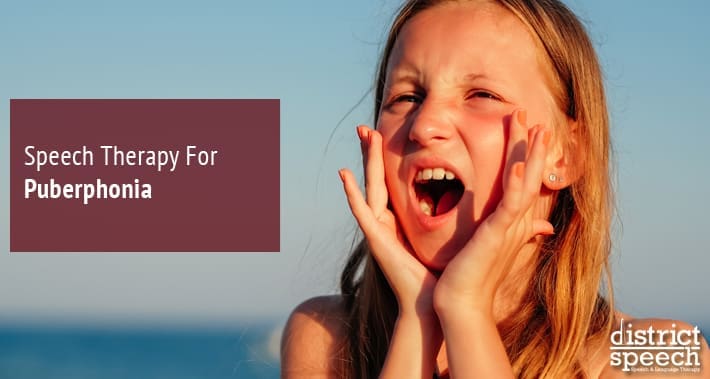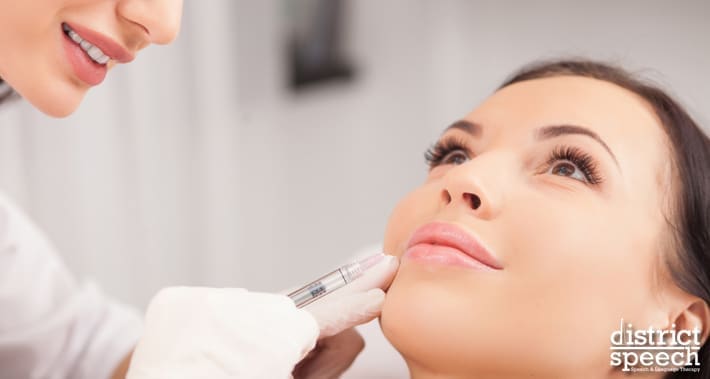
There are a lot of changes that come with puberty.
You start to develop secondary sex characteristics, hair growth where it wasn’t before, and stronger emotions, to name a few.
Another typical change is your voice getting deeper.
This is true regardless of your gender, but it happens significantly more for young boys.
When this doesn’t happen, it can be concerning.
While society doesn’t tend to think twice about a teenage girl or woman who has a higher pitched voice, it’s different for teen boys.
Not having your voice drop can be psychologically troubling for teen boys.
One cause of this is a condition called puberphonia, also known as functional falsetto.
If you find yourself experiencing this, or are worried about your teenage son, speech therapy for voice disorders can help.
As Washington DC speech therapists, we can help treat your puberphonia.
Read on to find out more about this condition, and how speech therapy can be used to help treat it.
What Is Puberphonia?
Typically, during puberty, people of all genders experience a drop in the pitch of their voices.
This drop in pitch is generally deeper for teen boys, who can expect their voice to drop by one octave on average.
Teen girls can expect a less noticeable drop, of a few semitones.
When this drop in pitch fails to happen, it’s called puberphonia.
Puberphonia is classified as a voice disorder.
Voice disorders happen when something about your voice, like its pitch or quality, doesn’t match factors about you, like your gender or age.
Voice disorders can be caused by a number of factors that change how your speech sounds.
These include things like issues with your voice box or vocal folds, issues with your nervous system, or functional issues like vocal fatigue.
What Are The Symptoms Of Puberphonia?
The primary symptom of puberphonia is the voice not lowering during puberty.
It occurs in males much more frequently than in females.
Other symptoms of this condition include:
- High pitched voice
- Voice frequency greater than 120 hertz for a man or 210 hertz for a woman
- Breathy or weak voice
- Hoarse voice
- Low intensity of the voice
- Trouble making your voice louder
- Becoming tired when speaking for a long period (decreased vocal endurance)
- Requiring increased effort to speak
- Fluctuations in vocal quality
- Tension in the neck and throat
- Intermittent issues with producing proper speech sounds
What Causes Puberphonia?
Voice disorders such as puberphonia can stem from many different causes.
These can be classified as psychological, neurogenic, or biological.
Biological causes often include problems with your larynx, also known as your voice box.
Biological causes may include:
- Tension in your laryngeal muscles
- Abnormalities in your larynx present from birth
- Hearing impairment
- Thyroid cartilage that isn’t fused properly
- Vocal cord paralysis
- Lack of muscle coordination
- Vocal cord polyps, cysts, or nodules
- Trauma to the larynx
- Asymmetrical vocal folds
- Inflammation of the larynx
Neurogenic causes could include:
- Parkinson’s disease
- Multiple sclerosis
- Laryngeal nerve paralysis
- Vocal cord spasms
Psychological or psychogenic factors may include:
- Resistance to the changes which come with puberty
- Stress (emotional stress or chronic stress disorders)
- Depression or anxiety
- Being self conscious when your voice breaks early
- General self consciousness associated with going through puberty
RELATED: Can Speech Therapy Improve Mental Health?
How Can Speech Therapy Help With Puberphonia?
If you’re worried because your child’s voice hasn’t dropped as they’ve gotten older, you should know that help is available.
When you work with a pediatric speech therapist for puberphonia, you or your child can train your voice to sound the way you want it to.
Let’s have a look at some of the techniques a speech therapist might use to help provide treatment for puberphonia.
Direct Voice Therapy
The most common way puberphonia is treated is through vocal exercises, also known as voice therapy.
These exercises should always be done under the direction of speech therapists who specialize in treating voice disorders.
Otherwise, you risk damaging your vocal cords.
The goal of voice therapy is to help you understand how your vocal cords function, be able to judge the pitch quality of your voice, and determine the pitch you want to achieve.
It may include the use of biofeedback devices to monitor changes to pitch accurately.
There are a lot of different techniques.
For example, your speech therapist might help you learn to relax your laryngeal muscles through yawning and sighing.
Coughing is another strategy.
Your speech therapist may have you apply pressure to your Adam’s apple and cough at the same time.
This can help shorten your vocal folds and reduce your voice’s pitch.
Humming and half swallowing techniques can also help you lower your voice’s pitch.
Your speech therapist might also have you use something called speech range masking.
This involves speaking with a loud noise playing and then listening back to a recording of your voice.
It can help you understand how to change your voice’s pitch in certain situations.
Finally, your speech therapist may help you use something called a glottal attack.
This is when you push air through your closed vocal cords to form vowel sounds.
Indirect Voice Therapy
Indirect treatments are generally used in tandem with direct treatments.
These include taking measures to ensure that your environment is one in which direct treatments will be most effective.
This may include counselling to identify psychological factors contributing to puberphonia and help to address these issues.
Indirect voice therapy can also include education on good vocal hygiene and education on how certain actions could affect their voice.
Audiovisual Feedback
Using audiovisual feedback can be a helpful tool when working to alter your voice’s pitch and range.
For example, your speech therapist might use a graphical representation of your voice.
This can help you see an ideal pitch range and work to bring you voice inside that range.
With practice, speech tasks involving pitch become more natural when used in conversation.
Audiovisual feedback, and the ability to see ones pitch visually, can help with your motivation to continue treatment as well.

Medical Interventions
In some extreme cases where other methods of treatment aren’t effective, medical treatment may be used for puberphonia.
The two medical interventions which could be used are Botox injections and surgery.
Botox injections can help with the relaxation of your muscles.
Surgery is generally a last resort option, used when all other forms of voice therapy have been tried unsuccessfully.
Surgical interventions can be used to help relax and shorten your vocal folds.
Surgery can be used to alter the position of your thyroid cartilage.
Surgery is not performed by a speech therapist, however.
Book Your Appointment With District Speech Today
Are you worried because your voice hasn’t dropped yet?
Do you feel self conscious because you sound a lot younger than you are?
Or perhaps you’re a concerned parent, who wants to help their child navigate this change as they get older.
Puberty can be hard enough.
Anything which causes your child to be “othered” by their peers can be hard to watch.
And kids can be relentless with teasing when someone doesn’t fit what’s expected at a given age.
Luckily, there’s help.
We’re District Speech, a Washington DC based speech therapy clinic.
We’ve helped patients overcome all sorts of speech disorders, and we can help you too.
Book your appointment with District Speech today.
1300 I St NW, Suite 400 E,
Washington, DC 20005
- https://g.page/districtspeech
District Speech and Language Therapy specializes in speech therapy, physical therapy, and occupational therapy solutions, for both children and adults, in the Washington D.C and the Arlington Virginia areas.